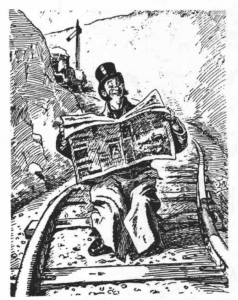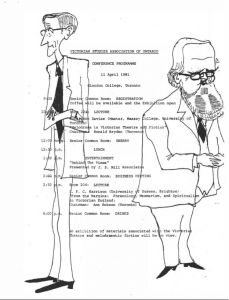The joys of digital preservation
For many years the Victorian Era has been a scholarly and personal interest of mine. It is an extremely relevant epoch; many of the “isms” that shaped and continue to influence the modern-day world either began or were strengthened during this time. Unfortunately, these ideologies included such restrictive, damaging philosophies as colonialism, imperialism, sexism, and racism. Equally true, however, the period also saw the rise of progressive, positive social justice approaches including abolitionism, compulsory education, conservation, environmentalism, feminism and universal suffrage. Leaving one of the most important developments to the last, we cannot forget the rise of librarianship.
When I first started working at York University Libraries (YUL), I was delighted to learn the Victorian Studies Association of Ontario (VSAO) was based at the university. I volunteered and was eventually elected to the executive as member-at-large and newsletter editor.
Trials and terrors

This article details my work transitioning 40 years of print VSAO newsletters into an online source, moving from essentially no access at all to 24/7 availability. Crossing this threshold had its fair share of trials and terrors but there were also a number of triumphs along the way.
The project began at the end of my tenure on the VSAO executive, when a long-term board member casually mentioned that an extensive VSAO archive of more than 40 years of banners, financial reports, meeting minutes, newsletters and more was all locked away in a filing cabinet.
I instantly asked if any of these materials were online but none were. Being a good academic librarian, I immediately applied for a YUL Research & Awards Committee grant. I had a proven track record in capturing historical material and providing stable online access to a completely forgotten turn-of-century national periodical. I had also successfully applied for three previous grants. However, my funding submission for the VSAO digitization project was denied. While disappointed, I resolved to carry on.
I next approached the York libraries’ in-house [EY1] digital repository only to learn there was a rigorous processing schedule with a prioritized list of items. Anything outside those parameters, such as my VSAO items, would be scanned last. The budget was also tight which meant progress, at best, would be piecemeal. The most optimistic outcome to hope for would result in a completion date of around 2020.

Undaunted, I arranged with my fellow VSAO board member to pick up the archive materials. However, instead of assorted papers, only newsletters filled the boxes. All previous discussions had centred on doing the other materials first, then the newsletters. When asked, the rationale given concerned editing all materials to avoid any possible embarrassments, such as materials which wouldn’t translate well into text or over time.
Too many lemons?
Surprised by this unexpected turn of events — a decided switch from our earlier agreements — the renowned motto on citrus fruit, namely, “Got too many lemons? Make Lemonade!” sprang to mind.
As it happened, aid for project came from an unexpected source. I had always maintained an excellent relationship with the IT person who volunteered his time and expertise to help maintain the VSAO website. Whenever I had previously had any difficulties with uploading the newsletters, for example, he would come to my aid, quickly and efficiently solving whatever problems that presented themselves. He and his assistant kindly agreed to scan all the print issues.
We began digitizing on Dec. 14, 2012; by Dec. 21 we had scanned, executed an Optical Character Recognition program and performed quality control on all of the copies. All content was mounted on the website by Jan. 14 2013 and I notified the executive committee to universal acclaim.
It then came to my attention that, in fact, eight more issues still had to be processed. Where had they been hiding? Why, in the library holdings, of course. I rather felt like the proverbial lawyer who died without a will. I had never considered searching our catalogue; I had been given the impression the boxes held the entire run of the newsletter collection. With any further ado, we scanned the remaining copies and added them to the website as well.
This handiwork may be viewed on the VSAO site here.
I hope this brief account of one digitization project has proven instructive; while it may seem like every step of the process is destined to encounter as many obstacles as possible, the lesson learned is to realize that a successful end result is indeed possible with perseverance and resourcefulness.
Peter Duerr is an Assistant Librarian with liaison responsibilities for Domestic Government Documents & Disaster Management at York University. As well, he acts as a Sustainability Ambassador which is associated with the President’s Sustainability Council. Peter can be reached at pduerr[at]yorku.ca


